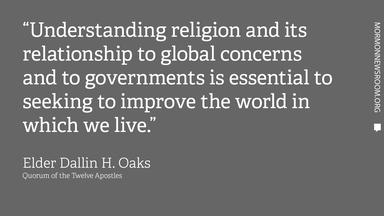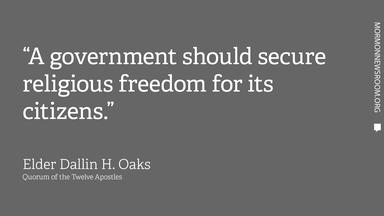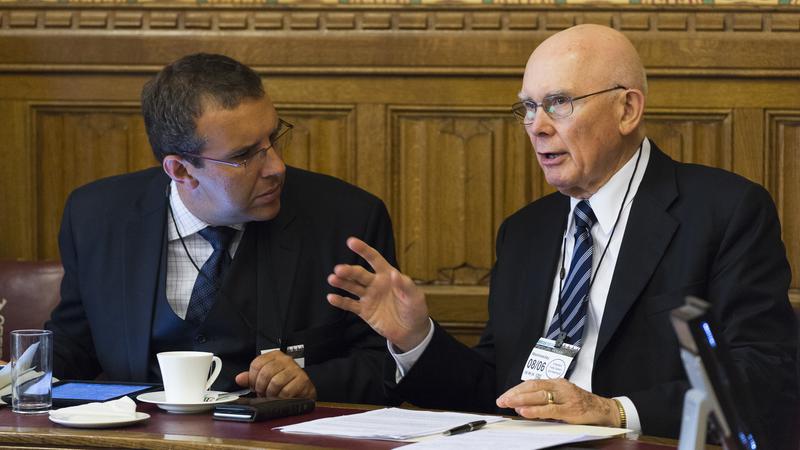“None of us can ignore the importance of religion globally — in politics, conflict resolution, economic development, humanitarian relief, and more,” said Elder Dallin H. Oaks of the Quorum of the Twelve Apostles of The Church of Jesus Christ of Latter-day Saints during a lecture Thursday, June 9, 2016, at St. Johns College at the University of Oxford.
The Mormon apostle addressed a group focused on religious freedom co-convened by the University of Oxford's Rothermere American Institute's Seminar in Constitutional Thought, Law Faculty Programme in Constitutional Government, Religion and International Relations Programme (Regents Park College), and Oxford Journal of Law and Religion.
“A government should secure religious freedom for its citizens,” argued Elder Oaks, a former Utah Supreme Court judge and University of Chicago law professor who has been writing and speaking on religious freedom for more than 50 years.

Elder Oaks said prominent voices are challenging protections for religion, which he noted are included in Article 18 of the 1948 United Nation’s Universal Declaration of Human Rights. “Other voices seek to marginalize religion and believers, such as by limiting religious freedom to teaching in churches, synagogues and mosques, while denying the exercise of religious beliefs in the public square.”
On Wednesday, June 8, the day prior to his address at Oxford, Elder Oaks also participated in the All-Party Parliamentary Group (APPG) for International Freedom of Religion or Belief, a meeting within the House of Lords at the UK Parliament in London. The group exists to raise the profile of international freedom of religion as a human right among parliamentarians, media, government and the public.
“While the right to freedom of religion or belief is critical to a civilised society, it is important to encourage our governments to push it to the top of their agendas,” said Baroness Elizabeth Berridge, a member of the UK House of Lords and co-chair of the APPG for International Freedom of Religion or Belief. "As one of the largest All-Party Parliamentary Groups in the UK, we welcome the continued backing of 24 stakeholder organiations, including dedicated support from The Church of Jesus Christ of Latter-day Saints. Such support is invaluable to Parliamentary work on this vital human right.”
Other participants in the APPG meeting included members of the Houses of Parliament; Robert P. George (Princeton University), chairman, U.S. Commission on International Religious Freedom; and professor Cole Durham (Brigham Young University, International Center for Law and Religion Studies). Baroness Berridge and Robert P. George also spoke at the Oxford gathering.
Robert P. George said at Oxford, “It’s not just governments that have responsibility to be powerful advocates for religious freedom. Faith groups have a huge responsibility too. It’s imperative that religious communities reach out, regardless of theological or cultural differences, to like-minded people on the other side of the religious divide.”
Findings from the Pew Research Center show 84 percent of the world’s population identifies with a particular religion. However, 87 percent of the world’s inhabitants live in countries with high or very high restrictions on religious freedom, according to Pew.
“Understanding religion and its relationship to global concerns and to governments is essential to seeking to improve the world in which we live,” Elder Oaks said at Oxford on Thursday.
Elder Oaks continued, “Although religious freedom is unknown in most of the world and threatened from secularism and extremism in the rest, I speak for the ideal in which the freedoms religion seeks to protect are God-given and inherent but are implemented through mutually complementary relationships with governments who seek the well-being of all their citizens.”
“Many of the most significant moral advances in Western civilization have been motivated by religious principles and persuaded to official adoption by pulpit-preaching,” said Elder Oaks.
Elder Oaks said a majority of the charity work in the U.S. “originated with and is still sponsored most significantly by religious organizations and religious impulses.” He added that Western societies are not held together by enforcement of laws but by those who voluntarily obey statutes because of their religious beliefs.
“I maintain that religious teachings and the religiously motivated actions of believers are essential to a free and prosperous society and continue to deserve special legal protections,” he explained.

Elder Oaks said there are complementary responsibilities between governments and religions and that “governments obviously have a right to expect obedience to laws and respect for culture” and that no country need offer sanctuary to organizations that promote terrorism.
He said the complementary functions of religion and government are being “severely tested” in Europe today.
“The massive inflow of refugees of mostly Muslim religion and culture into countries with a different culture and different religions obviously creates serious political, cultural, social, financial, and religious challenges,” Elder Oaks said. But he used the example of his own faith, The Church of Jesus Christ of Latter-day Saints, to show how religion and religious organizations can help in the short and long term.
Mormons have provided relief for the refugees in Europe, as well as for other humanitarian efforts around the world without regard to religious affiliation. In 2015, the Church was involved with 177 emergency response projects in 56 countries. In addition, hundreds of projects such as clean water, immunization and vision care impacted more than a million people worldwide.
Other examples include a 2015 partnership between LDS Charities, the humanitarian arm of the Church, and the British-based AMAR Foundation to construct primary health centers for the Yezidi minority in northern Iraq who were targeted by ISIS and a five-year relief effort in Southeast Asia following an earthquake and tsunami in 2004 that killed thousands of people in 14 countries.
“Care for the poor and needy is not optional or incidental in our Church,” said Elder Oaks.
He concluded his lecture by discussing several advantages the Church has that help magnify its impact, including experienced volunteers, financial contributions provided by members and a global grassroots organization that can be mobilized immediately. In March 2016, Church leaders invited women of all ages to help refugees in their local communities.
Elder Oaks is also scheduled as the keynote speaker at the J. Reuben Clark Law Society UK and Ireland Chapter Inaugural Annual Conference to be held at Chorley, Lancashire, on Friday, June 10.

| 1 of 2 | Temple Square is always beautiful in the springtime. Gardeners work to prepare the ground for General Conference. © 2012 Intellectual Reserve, Inc. All rights reserved. |
See All
|
